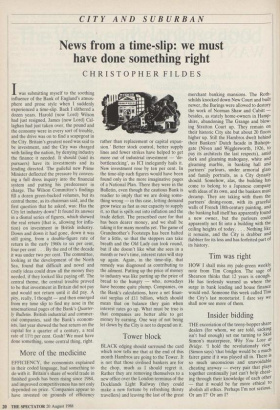More of the medicine
EFFICIENCY, the economists explained in their coded language, had something to do with it. Britain's share of world trade in finished goods has been rising since 1984, and improved competitiveness has not only depended on price. 'Companies appear to have invested on grounds of efficiency rather than replacement or capital expan- sion.' Better stock control, better supply lines and fewer strikes have helped to get more out of industrial investment — `de- bottlenecking', as ICI inelegantly hails it. New investment rose by ten per cent. In the time-slip such figures would have been found only in the more imaginative pages of a National Plan. There they were in the Bulletin, even though the cautious Bank is readier to imply that we are doing some- thing wrong — in this case, letting demand grow twice as fast as our capacity to supply it, so that is spills out into inflation and the trade deficit. The prescribed cure for that has been dearer money, and we shall be taking it for many months yet. The game of Grandmother's Footsteps has been halted for a little, so that the steppers can take breath and the Old Lady can look round, but if she doesn't like what she sees in a month or two's time, interest rates will step up again. Again, in the time-slip, that remedy was diagnosed as contributing to the ailment. Putting up the price of money to industry was like putting up the price of bread to the hungry — who, nowadays have become quite plump. Companies, on the Bank's calculations, have a net finan- cial surplus of £11 billion, which should mean that on balance they gain when interest rates go up. What must be true is that companies are better able to get money by earning. One way of not being let down by the City is not to depend on it.






















































 Previous page
Previous page